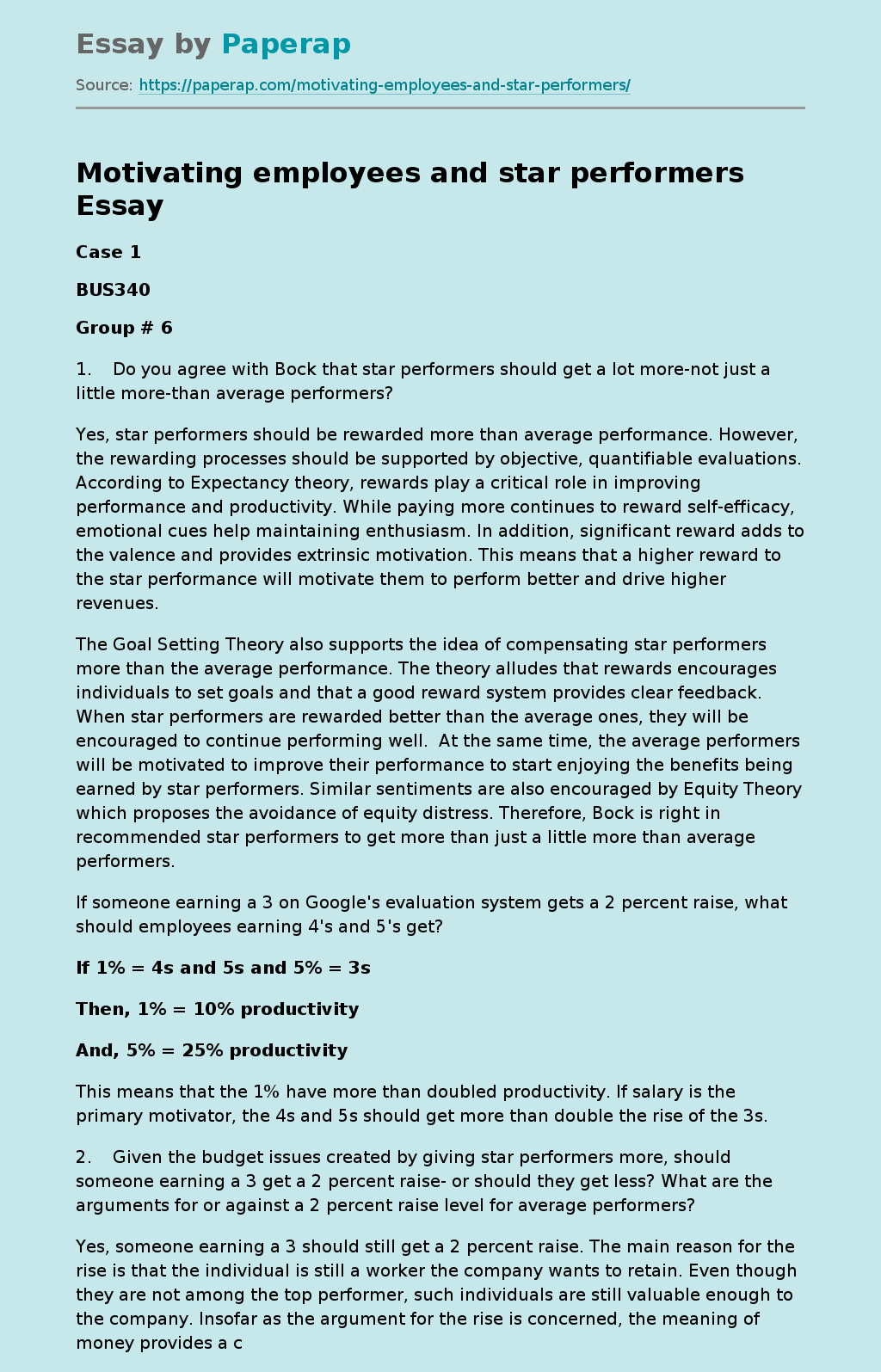Motivating employees and star performers
Case 1
BUS340
Group # 6
1. Do you agree with Bock that star performers should get a lot more-not just a little more-than average performers?
Yes, star performers should be rewarded more than average performance. However, the rewarding processes should be supported by objective, quantifiable evaluations. According to Expectancy theory, rewards play a critical role in improving performance and productivity. While paying more continues to reward self-efficacy, emotional cues help maintaining enthusiasm. In addition, significant reward adds to the valence and provides extrinsic motivation.
This means that a higher reward to the star performance will motivate them to perform better and drive higher revenues.
The Goal Setting Theory also supports the idea of compensating star performers more than the average performance. The theory alludes that rewards encourages individuals to set goals and that a good reward system provides clear feedback. When star performers are rewarded better than the average ones, they will be encouraged to continue performing well. At the same time, the average performers will be motivated to improve their performance to start enjoying the benefits being earned by star performers.
Similar sentiments are also encouraged by Equity Theory which proposes the avoidance of equity distress. Therefore, Bock is right in recommended star performers to get more than just a little more than average performers.
If someone earning a 3 on Google’s evaluation system gets a 2 percent raise, what should employees earning 4’s and 5’s get?
If 1% = 4s and 5s and 5% = 3s
Then, 1% = 10% productivity
And, 5% = 25% productivity
This means that the 1% have more than doubled productivity.
If salary is the primary motivator, the 4s and 5s should get more than double the rise of the 3s.
2. Given the budget issues created by giving star performers more, should someone earning a 3 get a 2 percent raise- or should they get less? What are the arguments for or against a 2 percent raise level for average performers?
Yes, someone earning a 3 should still get a 2 percent raise. The main reason for the rise is that the individual is still a worker the company wants to retain. Even though they are not among the top performer, such individuals are still valuable enough to the company. Insofar as the argument for the rise is concerned, the meaning of money provides a clear assertion. Essentially, employees are motivated by money. First, if the 4 and 5 employees are getting at least 3% raises, the employees earning only a 3 with 2% raises will strive to reach a higher raise. Second, people view money and raises as more than just economics. They are the motivating factors to work harder and be more productive. Third, equity theory is an important factor in this as well because every employee will know that they matter in an organization. Since Inflation still, when an average worker does not receive a raise to cover for the higher expenses, they will not be motivated to work harder.
On the opposing side, a 2 percent raise on average workers is not feasible. This is based on the argument that average behavior in an organization should neither be cordoned or rewarded. On the same note, average workers will not be motivated to work harder by being rewarded for average performance. They will also lack motivation to perform optimally if they are not subjected to any form of consequences for lack of effort (compared to other employees). In such a case, the company needs measures that discourage average performance while promoting motivation to improve performance.
3. Consider all of the things Google’s People Operations group does to motivate its employees. Which motivation theories do they seem to be leveraging, and how?
One of the theories Google seems to be leveraging on is the Expectancy Theory. According to this theory, self-efficacy should be among the top 5% of productivity. The theory is important to Google’s productivity because it encourages employees to put more effort in their work. The more effort an employee puts into a task, the higher the chances of successful performance and a better chance for that employee to be in the top 1% or 5%. Google’s employees, who are in the top 5% have a high level of self-efficacy. This is because of instrumentality, which implies that high productivity will result in belief of positive outcomes.
Google is also leveraging on the Goal setting theory. Under this theory, employees set goals to be in the top 5% of productivity. By having setting specific and difficult goals, their motivation and performance increase. In addition, psychological empowerment plays a critical role in their performance. Specifically, employees ranked 2s and 3s want to make a difference in the company to feel a sense of empowerment. Therefore, they are striving to be in the top 5% of productivity. This desire to get to the top keeps the employees mentally engaged, and determined to make an impact.
Motivating employees and star performers. (2019, Nov 19). Retrieved from https://paperap.com/motivating-employees-and-star-performers/

